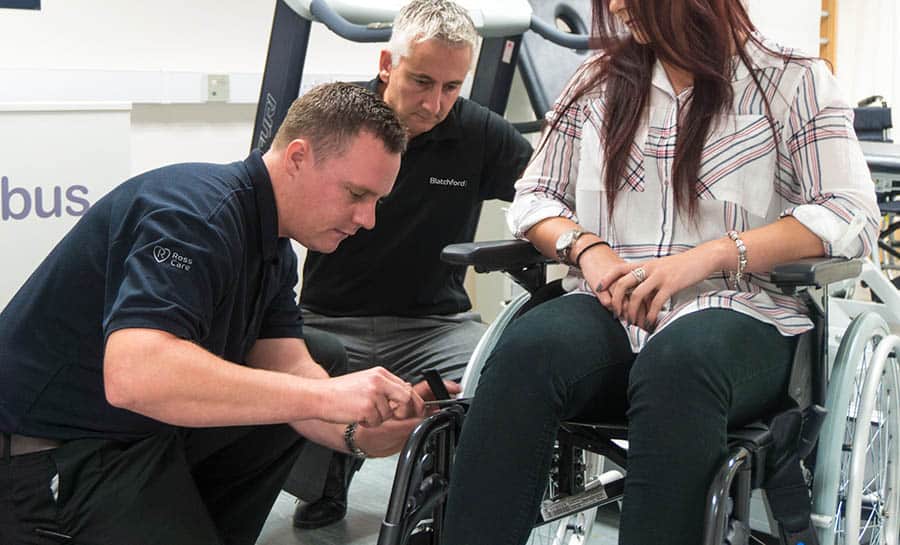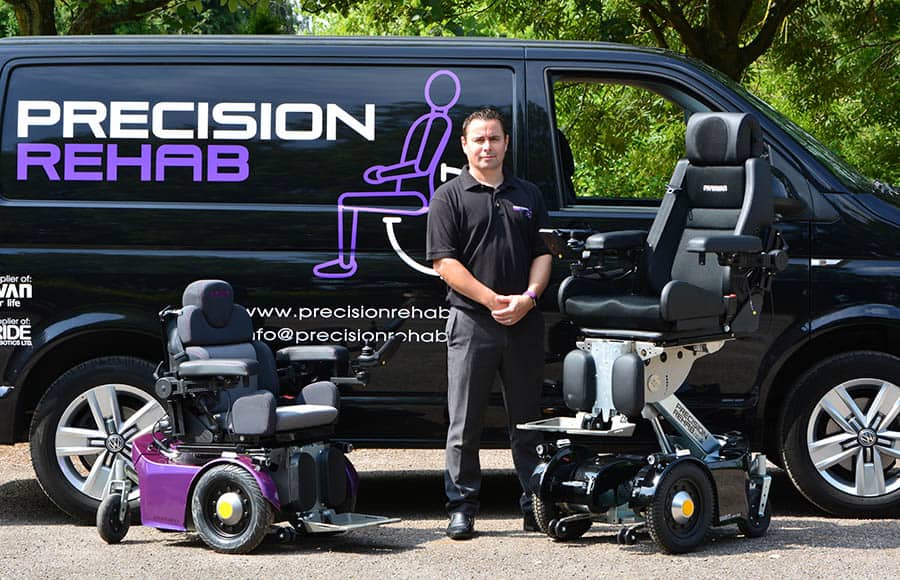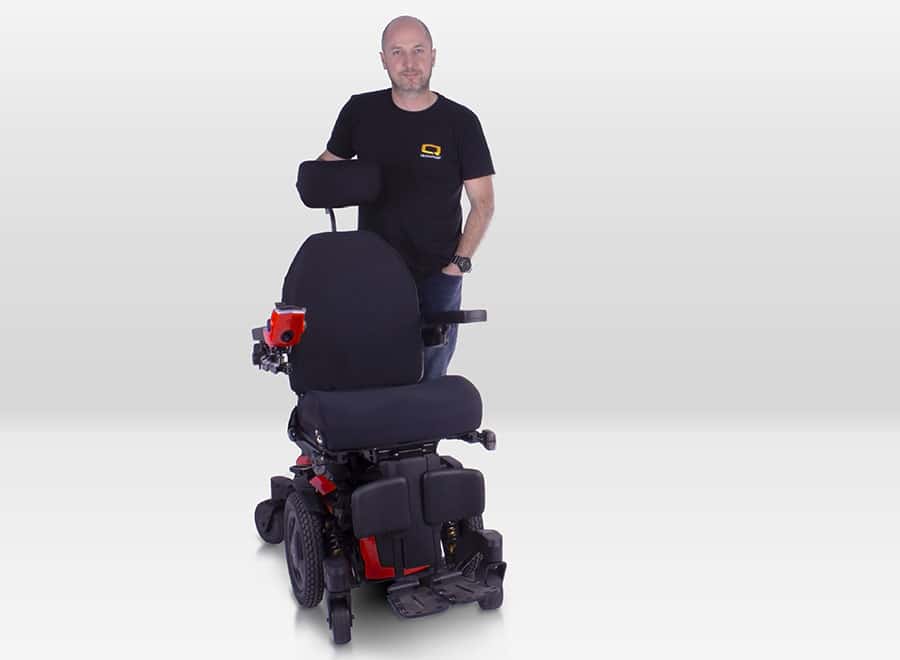Personal Wheelchair Budgets: Powering up the private powerchair market?

After December’s change in law made it a legal right for those eligible for NHS wheelchairs to access a Personal Wheelchair Budget (PWB), it is likely that 2020 will be the year the scheme will see a wide-scale rollout. Despite this legal eligibility extension, there is still a degree of uncertainty surrounding PWBs, particularly in regards to what the new system means for powerchair providers in the private market.
Over the past few years, there has been a lot of talk around PWBs as the NHS moves towards personalised healthcare for individuals with long-term needs.
Designed to give people with long-term conditions more control over their care, PWBs are planned and agreed between individuals and clinicians, allowing those in receipt of their budgets to spend the money to meet their personal health and wellbeing needs.
“The primary focus of PWB is on increasing the personalisation of care. In that regard, they very much build upon the work that has already been established through Personal Health Budgets,” explains Alastair Ronaldson, Marketing & Sales Manager of outsourced Wheelchair Services provider Ross Care.
“They do not signify an increase in funding for the purchase of powerchairs. Broadly speaking, what they do promote is a more holistic approach to assessing the needs of an individual and then looking at what additional wellbeing outcomes can be achieved through the specification of their wheelchair. PWBs also bring increased transparency to the individual on the budget allocated to them along with greater control of how this budget is used.”
Replacing the former wheelchair voucher system, PWBs will still enable individuals to opt to use their budgets in the private market outside of NHS commissioned services and should, in theory, support people to access a wider choice of powerchairs.
As of October 2019, the government confirmed that 40,000 wheelchair users had adopted PWBs, with that number set to grow in 2020 following the change in law and new guidance from NHS England issued to Clinical Commissioning Groups (CCGs) in December 2019.
The legal right covers people who are referred and meet the eligibility criteria of their local wheelchair service, as well as people already registered with a wheelchair service when they require a new wheelchair either through a change in clinical needs or in the condition of the current chair.
Aiming to accelerate the implementation of PWBs, guidance issued to CCGs in January by NHS England highlighted that “if a person comes within the scope of the right to have a personal health budget, then the expectation is that one will be provided.”
Stating that CCGs across the country must ensure they have the “necessary processes, support and information in place” to support PWBs, CCGs and Wheelchair Services have been busy developing how the new system will work.
Whilst each CCG is free to create their process for the allocation of PWBs and provision of wheelchairs, NHS England has outlined what powerchair users should expect from the new system.
According to NHS England, users will receive a personalised assessment and care plan to identify the health and wellbeing outcomes they wish to achieve, which may form part of a wider care plan which covers other areas of funding.
Wheelchair users should also be provided information about the amount of money available to them in their personal wheelchair budgets and options available to use the budget locally outside of NHS commissioned services, alongside information about wheelchair repair and maintenance if a user decides to go this route.

A change in wheelchair provision
On the surface, the shift in wheelchair provision policy sounds like it could result in more wheelchair users being prompted to consider the private market alongside NHS commissioned wheelchair services, potentially driving demand in the private sector.
Ross Care’s Alastair points out, however, that PWBs will not necessarily mean a rush of eligible budget holders turning to the private market but will rather fuel a significant change in the way NHS commissioned wheelchair services work to meet the needs of service users.
“In my opinion, the biggest determining factor of the scale of impact on the private market is the degree in which CCGs build links and work in partnership with other departments and organisations in order to pool funding as individual cases require it,” he comments.
“This does not necessarily mean that the equipment will always be supplied from outside of the NHS but it will certainly enable a much bigger uptake of a wider variety powerchair options than if it is just down to the individual to source their own funding.”
Pooling resources
It is the ability to integrate and pool different sources of funding that is perhaps the biggest change from the former voucher system, with NHS England aiming to ensure PWBs form part of wider care planning.
Equally, it is also the topic which some in the trade can see potential problems, given the somewhat fragmented nature of the health and social care system.
It is an area that Ross Care as a Wheelchair Services provider has been working on with CCGs to refine.
“One challenge will be the extent to which funding streams can be pooled now that there is a mechanism for it to take place,” notes Alastair.
“I have had the opportunity to meet with CCG steering groups and have been impressed by the work taking place to bridge departments, as well as the commitment to assess the success of outcomes,” says Alastair.
Working in partnership with Blatchford Clinical Services, who manage Ross Care’s clinics, the two organisations are currently involved in a project to achieve person-centred outcome measures, with the initiative being supported by Bangor University’s Centre for Health Economics and Medicines Evaluation.
“I think all providers of Wheelchair Services would agree that whilst PWBs are now fully in operation, 2020 will also be a year of learning and development,” he adds.
Beyond having a fundamental effect on the way Wheelchair Services assess and provide powerchairs to service users, the ability to bring funding together from other areas of the health and social care spectrum is one which powerchair retailers see as an opportunity to engage with budget holders.
One such company is Precision Rehab, a distributor and retailer of specialist powerchairs, with Managing Director Matthew James highlighting what prospects he envisages opening up following the wide-scale rollout of PWBs.
“It will offer a better understanding of possibilities and savings that can be made by merging the costs/budgets from different sectors,” he says.
“This will enable users to have a better product that will meet all their needs in a better, more cost-effective way, rather than buying many products to solve the same issue that may be cheaper individually but less effective and more expensive overall.
“We believe this will offer Precision Rehab a better chance of offering the right product at the right cost to meet needs and budget without compromising the individual’s actual needs because of budget constraints.”
“This will drive the private market to demo and supply their own products or supply what is not available on the NHS” John Payne, Kent Mobility
As well as powerchair retailers, manufacturers are also watching how PWBs develop, with the focus on greater choice presenting an opening for companies that have focused less on the NHS market.
Kevin Atkins, Senior Sales Manager of specialist powerchair manufacturer Quantum Rehab, says that the company has dedicated more of its efforts towards the retail market and hopes PWB will see more individuals look to local dealers and different chairs as a realistic alternative.
“Over the past few years, we have focused more on the retail sector as we found it quite difficult to get the NHS to consider other options away from a handful of suppliers they have been working with for many years,” he explains.
“It is understandable as people in Wheelchair Services get used to using certain types of products and become familiar with them, as well as having all the stock of spares available. It means switching to a new product range can be a challenge for them because all the engineers have to be trained and all therapists need to understand the different features and options which can create a barrier for other suppliers and products.
“Working with the retail-side is very different. We can usually speak directly with the decision-maker and if they see the benefits of offering our range then they can move to adopt it quickly. For their customers, it means access to more choice and the latest ranges so it would be great to see more individuals being encouraged to check out other options that are on the market.”
Know your funding streams
The big difference between Personal Wheelchair Budgets and the voucher scheme is the ability to pool funding from other areas to meet wider health and wellbeing needs.
For mobility retailers, understanding the different funding stream available to end-users and maintaining close relationships with therapists, alongside establishing a relationship with local Wheelchair Services, will be essential.
Awareness and understanding
One potential hurdle to a wide-scale rollout that is flagged across the board is the lack of awareness and understanding of PWBs, particularly amongst service users.

Despite CCGs being expected to introduce and develop plans to offer PWBs since April 2017 and the change in the law in December 2019, there is still confusion regarding how the system works.
The most up to date PWB guidance from NHS England states CCGs “must publicise and promote the availability of personal health budgets and personal wheelchair budgets, and provide information, advice and support to those eligible”, however, John Payne, Managing Director of Kent Mobility, claims that he has not seen this happening.
“We find that end-users are not being informed of the option to have a PWB or when they ask about them, they have been told that they are not being issued. This is direct feedback from our customers,” he alleges.
With such a significant shift being made to the way CCGs and Wheelchair Services providers work, Kevin points out that it is likely that PWBs will still take time to be fully implemented across the country.
“I think it will come down to resources available so some Wheelchair Services will be quicker than others to roll it out,” he suggests.
“It will also take time for people to know their rights but I think as people become more informed over the budgets and the options that are out there, it will result in powerchair users having more of a say over what they can have.”
Precision Rehab’s Matthew echoes Kevin’s thoughts, stating that “not many clients have heard about PWBs; they have heard of PIPs and vouchers. We believe that if the scheme is managed correctly, it will offer individuals more choice of product and a greater choice of supplier.”
Interestingly, as an organisation with experience delivering PWBs, Ross Care’s Alastair says that work is ongoing to raise awareness and proposes that the private market also has a role to play in raising awareness.
“Our aim is to work with service users so that they can make an informed choice knowing and understanding the options available to them. PWBs are already being given much greater visibility than perhaps the voucher scheme may have had, in fact, it is mandatory to do so,” he comments.
“However, the next stage is to raise awareness of what wheelchair solutions are available on the wider market for them to consider. This is where the private market really does need to engage and support NHS Services and I think retailers will be best served by taking a partnership approach to this.”
Who is responsible for the maintenance and repairs?
Budget holders that choose to use their PWB outside the NHS will receive a contribution towards the repair and maintenance of costs, however, it will be the responsibility of the individual to manage repairs and maintenance for the duration of the powerchair ownership. For powerchair dealers, this means having the capability to offer quick and efficient repairs and having access to spares will be vital.
Pricing predicament
With PWBs enabling service users to explore options on the private market much in the same way the former voucher system worked, it would be reasonable for private powerchair retailers to see more budget holders visiting their showrooms in search of a wider choice.
As stated, however, PWBs do not mean an increase in funding and the amount of funding that an individual is given is based on what it costs the NHS commissioned Wheelchair Services to meet the person’s assessed postural and mobility needs.
Speaking with Kent Mobility’s John Payne, he highlights that whilst users may receive a budget to the price that the NHS purchases its chairs for, the equivalent cost to purchase the same products in the retail market are not comparable.
“The risk we find ourselves in within the retail market is that the major manufacturers and importers are giving Wheelchair Services contractors huge discounts which have unbalanced the market,” states John.
“I cannot blame the end-user for accepting the same chair that they would have paid for in the retail market for either free or at a big discounted price. The blame lies solely with the manufactures.
“We find PWBs will be priced at the cost that would have been paid by the contracted Wheelchair Services providers for the products which will be a lot lower than what the end-user could purchase from the retail market. Unless they have private funds, they will probably go back to the NHS.”

Pushing powerchair innovation?
Interestingly, John suggests that this will prompt retailers to look and offer powerchair ranges not available through NHS commissioned Wheelchair Services.
“This will drive the private market to demo and supply their own products or supply what is not available on the NHS, giving a better quality and a better service for the end-users,” he adds.
Quantum Rehab’s Kevin Atkins also notes how the prices of powerchairs purchased by the NHS may have affected service user choice, indicating that PWBs may help to drive innovation in the market.
“One of our main challenges was that we weren’t prepared to meet the prices of some of the other manufacturers because the products we were bringing to the market were not designed to be basic entry-level products,” he describes.
“As a company, innovation is a top priority and we were not prepared to cut back on any areas of the finished product. I am not suggesting anyone else in the industry has done that but if you are selling a powerchair with such low margins, I believe you have to make savings somewhere, be it with features or materials.”
It is a sentiment shared by Precision Rehab’s Matthew, who adds: “The market has always produced low level, mid-level and high-end products. Low and mid-range level have been aimed at wheelchair services provision which means off-the-shelf products that are one-size-fits-all and mass-produced with limited innovation and where low budget is key.”
Working closely with the powerchairs available through Wheelchair Services, Alastair notes that innovation is still taking place for chairs designed for the NHS.
“In my opinion, the equipment available through Wheelchair Services has continued to improve over recent years. Perhaps innovation has been focused more on making features available to a greater number of people,” he maintains.
“I wouldn’t pretend to be in a position to speak to the development of powerchair technology at large but can certainly see there will be an increased interest in features that support peoples social and wellbeing requirements. The most visible case here is the number of elevating seat options now available.”

Quantum’s Kevin, however, emphasises that given the financial strain most Wheelchair Services are under and because of the volume that Wheelchair Services buy, even a model that may be £50 more expensive than its competitor can add up to a lot of money and influence the NHS’ buying decision.
“Of course, as a supplier, we want to work with the NHS. With this being a low-margin, high-volume environment, when we looked at reducing prices as much as we could, we were still slightly more expensive than our competitors on some products,” he continues.
“The idea of service users being empowered to explore alternative options available on the private market can only be a good thing and I do see it driving innovation, particularly as PWBs open up new routes to increase the funding available for the powerchair that people want.”
The environmental and financial impact of PWBs?
Wheelchair Services have infrastructures in place in regards to the repair and reissuing of powerchairs, however, Ross Care’s Marketing & Sales Manager Alastair Ronaldson highlights how PWBs may have the potential to disrupt this.
“We need to consider the broader impact on sustainability, both environmentally and financially for the NHS. The existing system relies on a program of recycling and refurbishment which enables a wheelchair to be put back into service after use,” he points out.
“PWBs have the potential to reduce the extent to which this can take place, which could in turn impact on the number of wheelchairs the NHS needs to purchase, as well as the number having to be scrapped.
“As a sector, we will need to find ways to respond and address this challenge if we are to secure its sustainability.”
How can retailers prepare?
With the potential for budget holders to seek out more choice with a PWB that may not stretch as far in the private market as it does within NHS commissioned Wheelchair Services, what can powerchair retailers in the market do to ensure they are prepared for the change?
Precision Rehab’s Matthew emphasises that his company is focusing on working closely with therapists and being aware of the different funding options available to end-users.
“We carry out assessments based on the clients’ needs, postural requirements and lifestyle and work closely with their occupational therapist or recommend a therapist that we work with locally to powerchair users,” he says.
“We choose the best product, accessories and modifications for the best solution and then we discuss all funding options and budgets, including disability-related funding. By looking at all funding avenues with each client, we hope the PWB scheme will offer a greater choice of product that best suits an individual’s needs.”
As well as having an understanding of available funding routes, Ross Care’s Alastair advises retailers to ensure that they have a sufficient level of repair and maintenance support to meet the needs of budget holders who will no longer receive this from NHS commissioned Wheelchair Services.
“The idea of service users being empowered to explore alternative options available on the private market can only be a good thing and I do see it driving innovation” Kevin Atkins, Quantum Rehab
“As all costs of upkeep are covered for patients staying within NHS provision, this needs to be carefully considered by those individuals who may choose to move outside of that system where currently they have access to larger teams of engineers and stocks of spare parts,” he says.
“Certainly, there are retailers that are well equipped to offer this but it is going to be a bigger obstacle to overcome in order to ensure there is sufficient and consistent coverage across the whole of the UK.”
Alastair also raises another interesting point: the importance of expert assessments.
“Similarly, a thorough and professional assessment process needs to be delivered to customers and if the retail sector is going to be able to respond to this requirement so that it happens in each case then there will need to be innovation to ensure high standards,” he continues.
“As an industry, I think it is likely that there will be a need to introduce some level of accreditation to help maintain standards.”
As different CCGs and Wheelchair Services continue to craft and shape how PWBs will work, retailers that are well-informed and capable of helping customers navigate the still somewhat muddy waters of PWBs will be best placed to benefit from the push to the more personalised approach to powerchair provision.
“My thoughts are, I am not sure if PWB will work but if we supply good quality products, reliable service and treat customers as we expect to be treated, they will keep coming back and will tell their friends,” concludes Kent Mobility’s John Payne.
“After all, it’s a growing market.”


